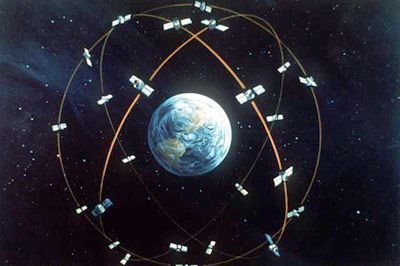Ad Astra (per Taxpayer)

One that works - Navstar
This is not a 'brutal' capitalist assessment. It is one that factors in a lot of pride in the seemingly impossible being achieved that we can all appreciate. The US gave up at the first hurdle, Concordski as I understand it did fly, but never went into commercial operation, but Concorde did and, for all its costs to the relevant exchequers, I'm as happy as mes frères français that it did. It broke through a barrier, that in their own way, so did projects as diverse as Bazelgette's sewerage system and the channel tunnel. Not one of these would have or will ever return cash to the taxpayer, and I don't care. I believe in small government, but on occasion government can deploy the strength of the resources that even the most minimalist of administrations can muster to catalyse something that, even with the best will in the world, the private sector of its own volition would just find to be a little bit of a step too far.
There really are the opportunities a good government should consider big ticket expenditure on; unfortunately we have Gordon Brown, the EU, and Galileo.
GPS was a fantastic innovation. I used to go sailing now and again and its navigational predecessor, in terms of hopping over to the Channel Islands, DECCA, was the most unreliable pile of cack I have seen outside a local government IT department. Along came Navstar/GPS and you knew exactly where you were for the price of a crew night at the only decent subcontinental food emporium in Lymington.
For some though, there is a problem. Not one that actually will ever put lives in jeopardy, something worse than that, it was a project with its roots in the US military. It is true that it is less accurate than the proposed European alternative. So far though, the value in this enhanced accuracy seems to be explained as either the ability to support new and innovative ways of taking more money out of the taxpayer's wallet, or, for reasons I guess to do with frequency ranges, the capability for the new system will work inside buildings too, so that hard pressed bureaucrats can find the nearest lavatories in the Berlaymont after a prolonged lobbying session with all the free booze it may have entailed.
Everyone knows it is fundamentally what one could crudely, but fairly, call a 'dick length' project, even within the governing party:
"What taxpayers in the United Kingdom and other European countries really need and want is better railways and roads, not giant signature projects in the sky," said committee chairwoman Gwyneth Dunwoody.
"The government must stop this folly and endeavour to bring the European Commission to its senses," the Labour MP for Crewe and Nantwich added.
She called for independent evidence that proceeding with Galileo - a rival to the US GPS system - was worthwhile and offered value for money.
Source: BBC News
Ambitious is not a word you would use in its normal tired political context for Ms Dunwoody, but in the idea of bringing the "European Commission to its senses" she does show that a spark of naive optimism cannot be fully extinguished by the mandarins.
Slightly less pleasing from the same story was the BBC commentary that:
In September, the EC said that unused agricultural and administrative funds from 2007 and 2008 could be used to plug most of the £1.7bn (2.4bn euro) hole in the project.
Source: BBC News
How good would have a statement saying "we've saved some money, so we don't need a superinflationary increase in funding this year" have sounded in place of "we've found another wall to piss it up"?
I would comment on whether some of the target dates quoted in the BBC article sound remotely attainable, even with a fair wind, in the context as described, but to do so would be an insult to the intelligence of anyone who can read it, let alone anybody who has run a project of a fraction of such complexity.
Just so long as there are swish launch parties for the the right people, what's the problem?





 RSS Feed - Main Blog
RSS Feed - Main Blog







No comments:
Post a Comment